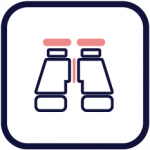Summary
Authentic and alternative assessments can be well supported in the online environment with thorough consideration and planning in place. Providing students with options for completion that are reflected in submission requirements for meaningful demonstration of learning, and clear guidelines for success, will engage students in assessments that are relevant to their understanding outside of the educational environment. When students see the value of an assessment for applying their learning to their professional goals, and understand how to complete that assessment well, levels of performance and individual connection will increase.
Key Takeaways
- Student opinion highlights the need for authentic and alternative online assessment practices coupled with effective and timely feedback.
- Barrier-free assessment design that follows accessibility guidelines, Universal Design for Learning practices, and inclusion strategies allows all students to successfully demonstrate their learning.
- Well-crafted rubrics, checklists, and rating scales communicate expected standards of performance to students and enable consistent evaluations.
- Constructive feedback, reflective self-assessment, and peer review are powerful tools to help students achieve their learning goals.

Explore Further
CAST (2020). UDL Tips for Assessment. Wakefield, MA: Author. [PDF]
College Libraries Ontario. (n.d.). Faculty Toolkit: AODA Resources. The Learning Portal.
McGill University. (2020, July 27). Peer Assessment (PA). Teaching and Learning Services (TLS).
Preston, J. P. & Claypool, T.R. (2021). Analyzing Assessment Practices for Indigenous Students. Frontiers in Education. Vol 6.
Steinhauer, E., Cardinal, T., Higgins, M., Madden, B., Steinhauer, N., Steinhauer, P., Underwood, M., Wolfe, A., & Cardinal, B. (2020). Thinking with Kihkipiw: Exploring an Indigenous Theory of Assessment and Evaluation for Teacher Education. In S. Cote-Meek, & T. Moeke-Pickering (Eds.), Decolonizing and Indigenizing Education in Canada (pp. 73-90). Canadian Scholars.
Vowel, C. (2016). Indigenous writes: A guide to First Nations, Métis & Inuit issues in Canada. Highwater Press.

References
Ali, H. (n.d.). The benefits and challenges of peer and self assessment in a formative and summative context: Literature review. City University of London.[PDF] https://staffhub.city.ac.uk/__data/assets/pdf_file/0016/440242/Literature-Review-The-benefits-and-challenges-of-peer-and-self-assessment-in-a-formative-and-summative-context.pdf.
Cambrian College. (2021). Single-point rubric. Teaching & Learning Innovation Hub. https://teaching.cambriancollege.ca/assess/rubrics/single-point/.
CAST (2020). UDL Tips for Assessment. Wakefield, MA: Author. [PDF] http://www.cast.org/publications/2020/udl-tips-assessments
Chowdhury, F. (2019). Application of Rubrics in the Classroom: A vital tool for improvement in assessment, feedback and learning. International Education Studies, 12(1), 61-68. https://doi.org/10.5539/ies.v12n1p61
Cornell University. (2021). Peer assessment. Center for Teaching Innovation. https://teaching.cornell.edu/spring-teaching-resources/assessment-evaluation/peer-assessment.
CSAA West Ed. (2021). Students Use the Formative Assessment Feedback Loop. Formative Insights. https://csaa.wested.org/formative-insight/students-use-the-formative-assessment-feedback-loop/
Digital Education Strategies, The Chang School. (n.d.). Understanding Document Accessibility. Ryerson University. https://pressbooks.library.ryerson.ca/docs/
Facilitating Learning Online – Fundamentals 2019 OER. SCoPE-BCcampus. https://scope.bccampus.ca/course/view.php?id=477
Lombardi, M. M. (2008, January). Making the grade: The role of assessment in authentic learning. Educause Learning Initiative (ELI) Paper 1. [PDF] http://www.educause.edu/ir/library/pdf/ELI3019.pdf
McGill University. (2020, July 27). Peer Assessment (PA). Teaching and Learning Services (TLS). https://www.mcgill.ca/tls/instructors/assessment/peer
Methot, S. (2021, January 4). A Trauma-Informed Approach to Teaching the Colonization of the Americas. Edutopia. https://www.edutopia.org/article/trauma-informed-approach-teaching-colonization-americas
Nicol, D. J. & Macfarlane-Dick, D. (2006). Formative assessment and self-regulated learning: a model and seven principles of good feedback practice. Studies in Higher Education, 31(2), 199-218. https://doi.org/10.1080/03075070600572090
University College London. (2021, February 2). Designing effective online assessment. Teaching & Learning. https://www.ucl.ac.uk/teaching-learning/assessment-resources/designing-effective-online-assessment
University of Ottawa. (2021, May-June). Online Assessment Perceptions, Practices, Needs and Recommendations: A Longitudinal Survey of uOttawa Students, Instructors and TAs. Survey data analysis completed by the University of Ottawa for the Rethinking Assessment Strategies for Online Learning course.
Yale. (2021). Creating and Using Rubrics. Poorvu Center for Teaching and Learning. https://poorvucenter.yale.edu/Rubrics.

